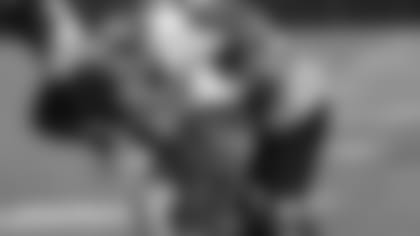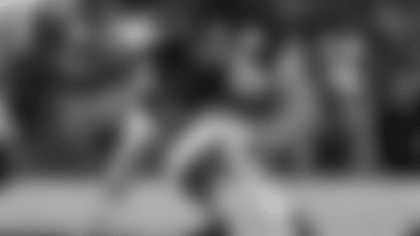Transcript of head coach Eric Mangini's news conference with the Jets media after Thursday's morning minicamp practice:
Little bit of housekeeping. Vernon Gholston will make his guest appearance tomorrow. That will be positive. I forgot what he looks like, but he'll be in [smiles].
Today, being the first day of minicamp, really we start the process again. I told you the thinking behind the structure of practices. Today, this morning, was a first- and second-down practice. This afternoon will be heavy third-down emphasis, like a Wednesday or Thursday [during the season]. The next practice will be like a typical Friday. The fourth practice will be sort of a catchall, review-type scenario.
That's the pattern we're going to follow. We followed it through OTAs, we'll follow it through this camp here, we will follow that same practice during training camp. What's nice about this format, especially for the rookies and the new players, is that we get a bit of a sense of what training camp will be like and what the two-a-day practices will be like. It is a very similar type of schedule. It does give them another look into how we run things in this environment.
On whether he has talked to Chris Baker today …
We spoke a little bit last night. I didn't really have a one-on-one with him today but did talk to him last night.
On what they talked about …
Not too much. We caught up a little bit, said hello. I thanked him for the note his wife sent to Julie about the impending birth of our third son. It was more of that than anything else.
On whether they talked about his contract ...
No.
On whether he is concerned that this will turn into a situation similar to Pete Kendall's last year ...
I'm not concerned at all.
On why he is not concerned …
I think that what we've done this off-season is really exciting. Whether it was the free agency, the draft, the development of the young players, the work we've done on the playbook, the scheme or the process, adding new coaches or moving to new facilities, there are a lot of good things going on.
Really, this camp is an extension of what I thought was 10 really positive OTA days and a really positive workout program that we've had in place. This is the second year of that. Really I think we've made some strides there as well.
That's what I'm focusing on. That's really what the group is focused on is those things and capitalizing on the momentum that we built up in OTAs, finishing strong through this minicamp, then finishing out the off-season program moving to training camp.
On whether he wants to avoid the negativity of a Kendall situation …
Well, you know that I'm an inherently positive guy. I have positive feelings all the time [smiles]. No, I think that it's part of the business. It's nothing that's unique to us. It's nothing that hasn't been experienced by pretty much everybody in the room, whether it's players or coaches. It's the business side. That's what it is. Everybody understands that. We're focused on the football side, getting that straightened out.
On what leads him to believe this won't turn into a situation similar to last year …
Like I said, I think that all the positive things that are going on and the way that the group is working, the focus of the group. I thought the focus of the group last year was good as well. I felt really positive coming out of OTAs and the things we did at that point in training camp.
Last season was last season. A lot of guys, myself and the coaching staff, we all could have done a better job. We played in a lot of close games we couldn't capitalize on. I never saw the group do anything but work as hard as they could to win the next game. I was proud of them for that. It's a very difficult situation.
But it wasn't a function of one experience, one guy or one situation. It was all of us needing to do a better job. That's really what we're doing right now, trying to improve and move forward, get ready for the next season.
On Baker's assertion that the organization promised to address his contract but then didn't …
I think the beauty of today is you get a chance to talk to Mike [Tannenbaum] after you have a chance to talk to me. You can talk to him about all the contract things. We can just sit down and enjoy our football chat.
On Baker's statement that the season had been "tanked" last year because of the dispute with Kendall ...
I've been on teams that have lost players in preseason, they've lost players at the start of the season, they lost players midseason and have played with a lot of different combinations of people. It's a really good group of guys we had last year. It's a good group of guys we have this year. I saw the way they worked every day, the way they continued to battle through those games and try to win the games. We were trying to win every game, saw consistency in their effort and their approach.
I think one person doesn't make or break any season. It's a function of everybody working together and everybody doing the best they can. Like I said, last year all of us — myself, coaches, players — could have done a better job. That's what we're trying to do now.
On if having to deal with this situation is uncomfortable for him …
I've been a part of a lot of different situations. I've been a part of coaching contracts, player contracts. It's just the nature of what we do.
On whether he's seen any feel-good stories among the rookies and free agents …
I've liked the progress David Clowney has made. I think he's a guy that has excellent deep speed. He has a history of special teams production in college. He got into our system last year when we picked him up from Green Bay, made some strides.
I like the strides that he's made to this point. I feel like he's worked at the learning side quite a bit, and it shows. He's starting to show up each day a little bit more on the tape. You have to see how that translates. I think that's a very positive sign, when we put the pads on, we get in those physical drills, preseason games, and see how he keeps going.
I've liked the progress of the offensive line. I think those guys have worked really well together as a group. Not just the first group, but the whole group, sitting in those meetings, and the level of communication. Bill [Callahan] being integrated into that group, I think that's been positive as well.
I like the communication overall of the defense. That's key. That's always, always critical in every phase. Defensively, we run a lot of shifts and motions. There are a lot of things that go on. I feel they've done a good job of adjusting through most of those things so far here early.
On how far behind he thinks Gholston will be …
He'll be behind. It's tough. You know, he'll be behind in a lot of different ways. He'll be behind in terms of his relationship with the other rookies, his relationship with the coaching staff, his being able to actually physically go through the drills, physically go through the plays, the adjustments, being in the huddle, and the amount of questions I'm going to ask him when he finally gets here.
All those things the other rookies have sort of taken a little bite at each day. You know, he's going to have to sit down at the buffet and eat it all.
On whether he thinks it's an antiquated rule that should be changed with the NCAA and NFL …
I understand exactly why it's in place. Anything that you can do to protect the students and encourage them to stay in school. You wish all the guys would stay in school and get their degree, or at least finish out whatever section they're in, because it gets harder to go back to school once you've been in the league. Even once you get out of the league, it's tough. You have a family, all those things going on.
I really want all of our guys to graduate. We encourage them, the guys that are close, even guys that are further away, to take a class in the off-season. Let us help you get back on that track, so they have that stuff in place.
On what he has done to keep Gholston up to date …
We try to talk to him every day. He has the information. He has the ability to watch the tape. So there are a lot of things that we can do over the phone. It still is very different than going through all the plays, all the adjustments and all those things. Nick [Mangold] did a really nice job when he was in the same situation. The first day was a little tough for him, but after that he rallied.
On what he thinks about Eric Smith at strong safety …
Eric is a guy that is incredibly smart. I think this might be a first — he turned down Harvard to go to Michigan State. Some of the books he's reading, I think a lot of us would struggle even getting the title out.
But he's impressive that way, having that understanding of the system. He's worked at understanding the system back there with Kerry [Rhodes]. His communication is getting better. I think those are all positives. I like his ball skills a lot. Now it's a function of getting the multiple reps, working with the first defense consistently. But he's done some really good things.
On what Abram Elam's tragedy says about his resiliency and character …
He's a very, very resilient guy. He's had a lot of personal things that he's had to fight through. This job is tough enough when you don't have all those situations that you have to deal with. He's worked through it. He's stayed on top of the information. He's done all the things that we've asked him to do. He's done it all well.
On if it's too early to say how the quarterbacks are doing …
I'd say it's way too early. We were talking about this a little bit either last week or the week before. There's a lot of experimentation going on as well as reviewing the old information, and that happens offensively and defensively, which creates variables.
So, you know, it's challenging at this point more from a mental standpoint than a physical standpoint. You're working with new guys, whether it's [Dustin] Keller or Bubba [Franks] or whoever it is. It's going to take a little time for that stuff to jell.
On how he thinks Keller is progressing …
It's kind of like all those guys, whether it's [Darrelle] Revis and [David] Harris, or [Nick] Mangold and Brick [D'Brickashaw Ferguson]. It's a whole new world. It's a shock to the system. Jumping in that cold pool, it's shocking. He has had to get used to new ways of doing things, new coaches, all that stuff.
You see the ability, but there is a lot of thinking. There's a lot of processing going on. He can't just go out there and run the play and understand, "OK, for this coverage, I have Cover-2 adjustments, this coverage I have to run this." It's processing. Anytime you're processing, you're slower than you should be.
On what he has seen from Danny Woodhead …
He's tough in the tackling drill. We're going to see what happens when the pads come on. He's made a lot of people miss in that drill. You see [Kris] Jenkins' tackle today? That was a first [laughter]. I might take a still of that.
That drill is one of my favorite drills, just because it is such a fundamental drill. It teaches guys how to run with the ball, whether it's the straight-ahead or angle tackling. It comes up every single day on tape. We'll do the tackling drill. There are three or four clips of exactly the same situation. The ball gets caught out in the perimeter. A guy is coming in from an angle. Corner is coming down. It translates. I think the guys appreciate the way that it translates and how quickly they can see their progress in that drill going into the field.
With Danny, he's nifty. He's got really good short-area quickness. You know, I'm not taking a dig at him with the "short" comment, but that's what he's got.
On the QBs pulling the ball down in 7-on-7 drills …
I think [Clemens] had two [sacks]. Chad [Pennington] had one [sack]. It's always good news to the defense and bad news to the offense when they're pulling it down in 7-on-7. You never really want to see that happen. It means there was good coverage in all the areas, tight coverage. It was a good day for Bob [Sutton], a bad day for Brian [Schottenheimer].
On whether he was talking about the tackling drill early in practice …
Yes, right after the bags, we go to the tackling drill.
On an explanation of the tackling drill …
When it's a straight-up tackle, so you're even with the ballcarrier, you want to choose a leverage angle one way or the other. Once I choose that leverage angle, I want to close the distance as much as I can, then I want to make sure if the guy breaks, he has to break back to my body. Now I know he only has a one way go.
That's what those guys are working on: closing the distance, establishing a leverage position, and understanding where he has to break. Which seems pretty easy to do, but it's difficult because the offensive guys are taught to get even. Because "if you're even, you're leavin'." Give yourself a two-way go, try to get as close as possible and fake him, not fake grass.
So they're both working against each other, and it's tough.














